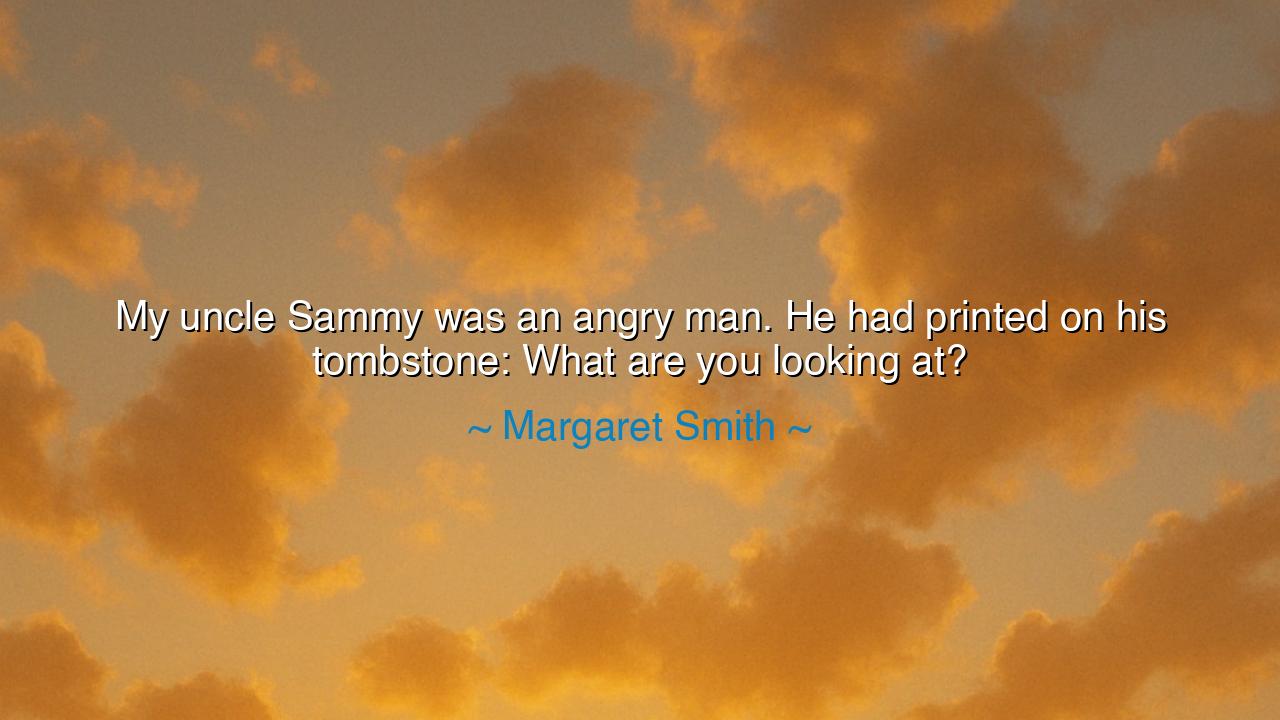
My uncle Sammy was an angry man. He had printed on his tombstone:
My uncle Sammy was an angry man. He had printed on his tombstone: What are you looking at?






In the deep recesses of the human experience, there lies a profound truth about the forces that shape us. Sometimes, the burdens we carry within are not ones of ambition or love, but of anger—a destructive force that can consume the heart, corrode the spirit, and shape a life in ways that leave indelible marks upon all who cross its path. Margaret Smith, with her sharp wit and insight into the complexities of human nature, once shared the tale of her uncle Sammy, an angry man whose final words, etched upon his tombstone, were a defiant declaration: "What are you looking at?" Through this simple phrase, we are invited to look deeper, to question the nature of anger and the legacy it leaves behind.
Anger, as the ancients taught, is a fire that burns not only the one who harbors it but also those in its vicinity. Sammy’s anger was a defining characteristic, an echo of the deep and unspoken pain that many, in their own ways, carry with them throughout their lives. His tombstone, a final statement to the world, suggests not only a man’s frustration with life but also his resistance to the world around him. His defiance, as captured in those few words, speaks to a profound isolation—a man who perhaps felt misunderstood, disrespected, or powerless in a world that could not or would not meet his needs.
Consider the ancient hero Achilles, a warrior whose rage and wrath were as legendary as his skill in battle. In Homer's Iliad, Achilles' anger towards Agamemnon was a catalyst for much of the chaos that ensued in the Trojan War. Achilles was a man of great strength and valor, yet his anger made him blind to the broader world, clouding his judgment and leading him to moments of profound isolation. Like Sammy, Achilles allowed his rage to define him, causing him to withdraw from those who sought to help him and losing his connection to the love and respect he once held.
Anger can be a mask for deeper wounds, often shielding the heart from the vulnerability of grief, fear, or inadequacy. Sammy’s defiant words on his tombstone might suggest that his life was defined by a struggle against the perceived world, but behind that struggle, there may have been deeper emotional turmoil. In ancient teachings, it is said that one who harbors anger without understanding its root is like a warrior whose sword strikes blindly—powerful yet misdirected. True strength lies not in anger but in the ability to transform it, to confront and understand its source, and ultimately to release it in favor of peace.
But there is wisdom to be gleaned from the story of Sammy’s tombstone, for it reveals a crucial lesson about legacy. What are we leaving behind? Are our actions, our words, and the energies we carry with us shaping the world in a way that brings honor and peace, or are they simply declarations of defiance and bitterness? In Sammy’s final words, we are reminded that the way we choose to respond to the world—whether through love, peace, or anger—will echo long after we are gone. Our legacies are not merely the deeds we do but the energy we leave behind, the way we influence those who come after us.
In our own time, we may find ourselves often frustrated with the circumstances of our lives, facing setbacks, injustices, and challenges that provoke feelings of anger. But as the ancients taught, the key to wisdom lies in understanding the emotions we feel, not letting them control us. Like the philosopher Socrates, who spoke often of the importance of self-examination, we must look inward and ask ourselves why we feel anger, what it is we are truly defending, and whether the energy we put into our fury could be better spent on building bridges, healing wounds, and creating a life of meaning.
The lesson here is profound and timeless: anger, when unchecked, can become the architect of our downfall. But when we turn inward and examine its roots, we can reclaim the power it holds and use it for transformation. Let us not be like Sammy, whose life was defined by his refusal to look beyond his anger. Let us, instead, strive to transform our inner struggles into wisdom and compassion. May we learn to leave behind not defiance, but a legacy of peace, understanding, and love that will inspire those who follow.
So, take a moment today and reflect: What is the energy you are leaving behind? Is it one of peace, understanding, and healing? Or is it one of anger, bitterness, and defiance? Seek the wisdom of the ancients, who remind us that we are not merely the sum of our frustrations and rage, but the creators of our own legacy. Embrace the journey of self-discovery, and let us leave behind a world better than the one we entered, shaping it with the power of love, understanding, and transformation.






AAdministratorAdministrator
Welcome, honored guests. Please leave a comment, we will respond soon